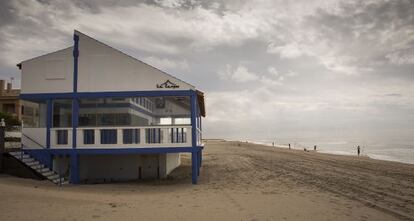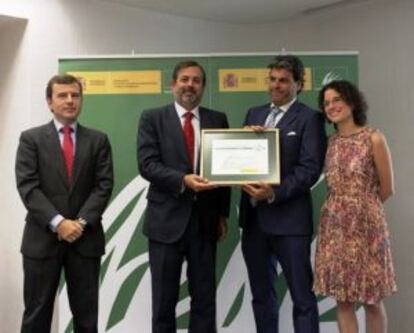Prize-winning, but is it legal?
La Carpa beach bar wins environmental award despite complaint by Civil Guard


It is perfectly possible to build a 150-square-meter concrete cube right on the sand of Matalascañas beach (part of the protected Doñana National Park), be reported by the Civil Guard for violating coastal protection laws, and still receive an award from the Spanish Environment Ministry.
La Carpa, a beach bar not 20 steps away from the shore, has received a 4,000-euro prize for being a "responsible establishment." This is because of its "selective waste and used-oil management, its smoke-extraction system, its controlled water discharge and its automatically regulated LED lighting."
The secretary of state for the environment, Federico Ramos, personally handed the award to the owner of the bar on September 23 along with four other establishments also being held up as role models of "economic activities that respect the environment and help protect the shoreline."
Many residents of Matalascañas, which is part of the nearby municipality of Almonte, could not believe their ears when they heard the news. Last year, La Carpa was the target of a complaint by Seprona, the Civil Guard's nature protection service, for an alleged crime against zoning laws in a maritime area that is in the public domain.

Under the 1988 coastal protection law, which virtually nationalized the shoreline to protect it from untrammeled development and ensure public access to it, any building as far as 100 meters from the public maritime border (defined as the outer limit where the waves have reached during the worst storm on record) fell under strict conditions regarding property transfer and refurbishment work. Many existing homes and businesses became effectively illegal. One of the first things the conservative Popular Party did when it came to power at the end of 2011 was to reduce this margin from the public maritime border to just 20 meters, thereby granting an amnesty to thousands of buildings.
The thing is, the city of Almonte never stopped the owner of La Carpa from erecting his massive beach bar. The latter admitted to a judge in April 2013 that he undertook the construction work without a building permit, but noted he had requested one and paid for it in advance at city headquarters. Both that license and another special permit to occupy the public domain area were granted to him when the bar was already up. The owner underscored that at no time did any official from Almonte put a stop to the construction work.
The establishment's name, La Carpa (The canopy), pays tribute to the fact that for the past two decades it had been nothing more than a wooden structure with an awning over it to protect patrons from the sun as they drank their beers and ate their tapas.
Although the new and improved La Carpa tries to preserve that original look with paint that imitates wood, this place looks nothing like it used to: where a flimsy tent-like structure once stood, there are now three stories made of concrete.
"I wouldn't be caught dead in there," says local resident Lope Vega, speaking in the garden of his own house. "I will not go in and be a victim of all the curses I have put on that place." The crash of the waves can be heard but not seen from the garden. That is because La Carpa has completely blocked his view of the sea. He, too, has filed a complaint against the beach bar.
La Carpa opened its doors on July 1, 2012. The building license was approved by Almonte on April 5, 2013. Town sources said the delay was due to the fact that the local law regulating building in that public domain area was not ready until January 2013. The same sources said that both the government of Andalusia and the central government considered the ongoing work "authorizable" even if the paperwork was not complete. Now, the courts will decide whether a crime was committed.







































